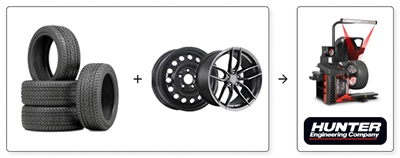The Impact of Winter Tires on Fuel Consumption

Smart Choices for Savings and Safety
As temperatures drop and roads become slippery, equipping your vehicle with winter tires becomes essential. Not just for safety, but also for your car's efficiency. An often overlooked aspect is the impact of these tires on fuel consumption. At pmctire.com, we understand the importance of making informed choices. This article aims to guide you in these choices.
The Efficiency of Winter Tires: A Double-Edged Sword
Winter tires are designed to provide better grip and stability on snow and ice, thanks to a softer rubber compound and specific sipes. However, this same design can increase rolling resistance, which directly impacts fuel consumption.
Rolling Resistance and Fuel Consumption
The rolling resistance of winter tires is generally higher than that of all-season or summer tires. Greater resistance means that your vehicle must expend more energy (and therefore fuel) to move forward. According to various studies, this increase can vary from 2% to 10%, depending on the type of tire and driving conditions.
Choosing the Right Tires for Savings
The key to minimizing the impact on fuel consumption lies in the choice of tires. Recent models often have better energy efficiency. Here are some popular and high-performing models:
- Michelin X-Ice Snow: Known for its durability and excellent performance on ice and snow, while offering reduced rolling resistance.
- Bridgestone Blizzak WS90: Renowned for its cutting-edge technology in terms of grip on winter roads and improved energy efficiency.
- Continental VikingContact 7: This tire combines exceptional grip on snow and ice with low rolling resistance.
Look for tires with a good rolling resistance rating and consider high-quality winter tires that offer a good balance between grip and energy efficiency.
The Role of Tire Pressure
A crucial aspect is tire pressure. Under-inflated tires increase rolling resistance, thus worsening fuel consumption. Be sure to regularly check the pressure, especially in winter, as low temperatures can reduce tire pressure.
Tire Lifespan and Consumption
It is also important to consider the lifespan of your winter tires. Worn tires can lose their effectiveness, thereby increasing fuel consumption. Timely replacement ensures not only your safety but also optimal fuel consumption.
Safety and Fuel Economy, a Question of Balance
The use of winter tires is indispensable for safe driving in the cold season. However, it is crucial to choose tires that offer a good balance between grip and energy efficiency. At pmctire.com, we help you make this informed choice, offering a wide range of winter tires suited to your needs and vehicle. Don't forget to regularly check your tire pressure and replace them as needed to optimize your fuel consumption while staying safe on the road.


